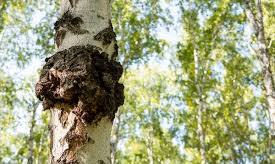
Unveiling the Potency of Birch Chaga: Exploring its Distinctive Phytochemical Composition Compared to Other Chaga Varieties
Birch Chaga vs. Other Tree Chagas
Chaga mushrooms, known for their medicinal properties, have gained immense popularity in recent years. Among the various Chaga varieties, Birch Chaga stands out as the most potent and valuable. In this article, we will delve into the reasons behind Birch Chaga's superiority over other tree Chaga varieties, exploring its unique phytochemical composition and the potential health benefits it offers.
Understanding Chaga Mushrooms: Chaga mushrooms (Inonotus obliquus) are fungi that grow primarily on trees in cold regions, such as Siberia, Canada, and Northern Europe. These mushrooms have a distinctive appearance, resembling burnt charcoal or a black corky mass. They have been used in traditional medicine for centuries due to their potential health benefits.
Birch Chaga: The Powerhouse of Chaga Varieties: Birch Chaga, as the name suggests, grows exclusively on birch trees. It is widely regarded as the most potent Chaga variety due to its unique phytochemical composition. Birch Chaga contains a higher concentration of bioactive compounds, which contribute to its potent medicinal properties.
Phytochemicals in Birch Chaga: a) Betulinic Acid: One of the key phytochemicals found in Birch Chaga is betulinic acid. Betulinic acid is a triterpenoid compound that is abundant in birch bark, which Chaga absorbs from the birch trees it grows on. This compound is known for its potential antitumor, antiviral, and anti-inflammatory properties.
b) Polysaccharides: Birch Chaga is also rich in polysaccharides, complex carbohydrates that contribute to its medicinal benefits. Polysaccharides have been shown to enhance immune system function, promote cellular communication, and exhibit antioxidant properties.
c) Antioxidants: Birch Chaga contains a variety of antioxidants, including superoxide dismutase (SOD), melanin, and polyphenols. These antioxidants help neutralize harmful free radicals in the body, protecting cells from oxidative damage and promoting overall health.
d) Melanin: Birch Chaga contains melanin, a pigment that gives it its dark color. Melanin has been shown to possess potential antitumor, antiviral, and immunomodulatory properties. It may also play a role in protecting the mushroom itself from damaging ultraviolet (UV) radiation.
Comparing Birch Chaga to Other Tree Chaga Varieties: While Birch Chaga boasts a robust phytochemical profile, other tree Chaga varieties also offer their unique benefits. However, the concentration and combination of phytochemicals differ, contributing to variations in potency and therapeutic potential.
a) Spruce Chaga: Spruce Chaga, found on spruce trees, contains a moderate concentration of bioactive compounds. While it may not match Birch Chaga's potency, it is still valued for its immune system support and general well-being benefits.
b) Pine Chaga: Pine Chaga, growing on pine trees, possesses its unique phytochemical composition. It is known for its potential anti-inflammatory properties and is often used to alleviate symptoms of arthritis and joint pain.
c) Alder Chaga: Alder Chaga, growing on alder trees, offers a milder taste compared to Birch Chaga. It is rich in antioxidants and is believed to promote overall wellness and vitality.
d) Oak Chaga: Oak Chaga, found on oak trees, stands out for its robust flavor profile. It is known for its potential anti-cancer properties due to its high levels of antioxidants and immune-boosting compounds.
Factors Influencing Phytochemical Composition: The distinct phytochemical composition of Birch Chaga can be attributed to several factors, including the specific tree species it grows on, the geographic location, climate, and environmental conditions. Birch trees provide a unique set of nutrients and bioactive compounds that are absorbed by Chaga, resulting in its exceptional potency.
Potential Health Benefits of Birch Chaga: Birch Chaga's potent phytochemical composition translates into numerous potential health benefits, including:
a) Immune System Support: The polysaccharides present in Birch Chaga can enhance immune system function, helping the body ward off infections and diseases.
b) Anti-inflammatory Properties: The combination of betulinic acid and other compounds in Birch Chaga contributes to its potential anti-inflammatory effects, reducing inflammation in the body and alleviating symptoms of conditions like arthritis.
c) Antioxidant Protection: The antioxidants found in Birch Chaga, including SOD, melanin, and polyphenols, help combat oxidative stress, protecting cells from damage and promoting overall well-being.
d) Adaptogenic Properties: Birch Chaga, like other Chaga varieties, is classified as an adaptogen. It helps the body adapt to stress, promoting balance and overall vitality.
Safety Considerations: While Chaga mushrooms, including Birch Chaga, are generally safe for consumption, it is important to source them from reputable suppliers. Proper identification and processing ensure the mushrooms' quality and eliminate potential contaminants. It is advisable for individuals with specific health conditions or those taking medications to consult their healthcare provider before incorporating Chaga into their routine.
Birch Chaga distinguishes itself as the most potent Chaga variety due to its unique phytochemical composition. The higher concentration of bioactive compounds, including betulinic acid, polysaccharides, and antioxidants, contributes to its exceptional medicinal properties. However, other tree Chaga varieties, such as Spruce, Pine, Alder, and Oak Chaga, also offer their unique benefits. Regardless of the variety, Chaga mushrooms continue to captivate health enthusiasts worldwide for their remarkable potential health benefits.
